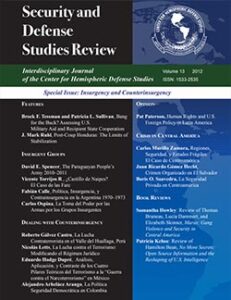The purpose of this research is to determine, from a systemic perspective, how the activities of organized crime in the country are affecting its governance and governability. The author proposes that: Currently in El Salvador organized crime (OC) in its eagerness to increase its profits, control of trafficking routes and markets has become a strategic actor whose activities are affecting the country's governance and governability by destabilizing its political, economic and social spheres. This research presents a comprehensive study of the dynamics in which OC networks are immersed and the negative effects of their activities in El Salvador. At the same time, it identifies the vulnerabilities of the Salvadoran state, as well as the weak points through which these nefarious organizations are permeating its structures and institutions. The author concludes by saying that the Salvadoran State, despite its efforts, does not respond to the requirements and security needs of the population and that the continuation of this course will lead it to gradually lose legitimacy, until it enters a crisis of governability. He proposes that the way to overcome this vicious dynamic is to resort to all available resources, including private security, duly controlled and regulated.

